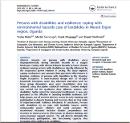| dc.contributor.author | Yeeko, Kisira | |
| dc.contributor.author | Martin, Ssennoga | |
| dc.contributor.author | Frank, Mugagga | |
| dc.contributor.author | Daniel, Nadhomi | |
| dc.date.accessioned | 2023-10-24T09:33:15Z | |
| dc.date.available | 2023-10-24T09:33:15Z | |
| dc.date.issued | 2022 | |
| dc.identifier.citation | Kisira, Y., Ssennoga, M., Mugagga, F., & Nadhomi, D. (2023). Persons with disabilities and resilience: coping with environmental hazards case of landslides in Mount Elgon region, Uganda. Environmental Hazards, 22(4), 349-366. | en_US |
| dc.identifier.uri | https://doi.org/10.1080/17477891.2022.2149454 | |
| dc.identifier.uri | https://hdl.handle.net/20.500.12504/1469 | |
| dc.description.abstract | Adverse impacts on persons with disabilities occur
disproportionately during landslide hazards in a rugged
landscape. Coping with climate-induced hazards to boost disaster
resilience among persons with disabilities is directly influenced by
the deepseated power relations in society. The study explored
coping mechanisms and assessed their perceived effectiveness in
boosting resilience of persons with disabilities in the Ugandan
fragile ecosystem. A cross-sectional design with 55 in-depth
household interviews, seven key informant interviews and two
focus group discussions were used. Quantitative data was
analysed using descriptive statistical methods. Content analysis
was carried out for qualitative data. Whereas persons with
disabilities highly opted for relocation/resettlement, it was also
perceived as less effective in boosting landslide resilience. Self-
help groups, use of assistive devices, access to early warning, and
participation in disaster training and recovery plans in their order
of importance-built resilience effectively. In conclusion, Persons
with disabilities try to cope with landslide hazards amidst
unfavourable power relations and social exclusion. We
recommend increased inclusive disaster preparedness and
recovery to boost access to information on disaster training, and
socio-economic support services. This will directly stimulate the
infrastructural, participation, and functioning capacity thus
increasing their resilience to Landslides. | en_US |
| dc.language.iso | en | en_US |
| dc.publisher | Taylor and Francis- Environmental Hazards, | en_US |
| dc.subject | Persons with disabilities | en_US |
| dc.subject | Power relations | en_US |
| dc.subject | Disaster resilience | en_US |
| dc.subject | Landslide hazards | en_US |
| dc.subject | Uganda | en_US |
| dc.title | Persons with disabilities and resilience: coping with environmental hazards case of landslides in Mount Elgon region, Uganda | en_US |
| dc.type | Article | en_US |

